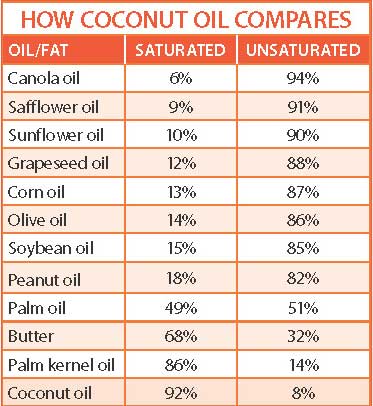Coconut Oil: Facts, Myths, and Practical Advice
Type in “coconut oil” on your computer, smartphone, or tablet and you’ll find plenty of people advocating the use of coconut oil in everything from cooking and baking to salad dressings and desserts, as well as hair and skin products. However, you won’t find any major, reputable health organizations, such as the National Institutes of Health, the American Heart Association (AHA), or the American Cancer Society, recommending that you start using more coconut oil and less olive oil—or any other type of oil that’s high in unsaturated fat.
In fact, the AHA issued an advisory (published June 15, 2017 in the journal Circulation) based on an analysis of more than 100 studies reaffirming that saturated fat raises unhealthy LDL cholesterol levels, which are associated with higher risks of cardiovascular disease (CVD) and a higher incidence of heart attack and stroke. The advisory said that reducing saturated fat intake, along with increasing mono- and polyunsaturated fat consumption, reduced the risk of CVD by as much as 30 percent.
Although the advisory addressed the broad topic of dietary fats and cardiovascular disease, it did make specific mention of coconut oil, pointing out that coconut oil is predominantly saturated fat, with more than 11 grams per tablespoon—about 85 percent of the AHA’s recommended limit of 13 grams for an entire day.
 Why the Coconut Craze?
Why the Coconut Craze?
Notwithstanding health experts’ opinions, one survey found that 72 percent of consumers believe that coconut oil is healthy—so where are these beliefs coming from?
“The saturated fats found in coconut oil are a specific type called medium-chain triglycerides (MCTs), which are different from most of the saturated fats found in animal foods, such as butter, beef, pork, and cheese,” explains Jenna Rosenfeld, MS, RD, CDN, CNSC, a senior registered dietitian at Weill Cornell. “The evidence surrounding MCTs suggests that they may have different properties than the long-chain saturated fats generally found in animal foods, although the evidence is limited.”
People who have problems absorbing fat can digest these MCTs more easily, she adds. “But the jury is still out if MCTs are beneficial for people without digestion problems. Some research suggests that coconut oil may be helpful in reducing abdominal fat and blood sugar levels, as well as increasing ‘good’ HDL cholesterol levels, but the research is not strong enough to recommend using a lot of coconut oil in your diet.”
In fact, Marie-Pierre St.-Onge, the scientist who conducted the research upon which many of the popular coconut oil claims are based, has pointed out that she used a special 100-percent MCT oil in her study, whereas most coconut oils have an MCT content of 13 to 14 percent. To get the amount of MCT oil used in the study, you’d need to consume about 10 tablespoons of coconut oil in a day, which would add up to more than 1,200 calories and about 130 grams of total fat.
Practically Speaking
If you use coconut oil instead of another vegetable oil occasionally when you’re making a meal, your risk of cardiovascular disease isn’t going to skyrocket. However, since coconut oil is so high in saturated fat, save it for special recipes that will benefit from its tropical flavor. The rest of the time, stick with vegetable oils that are high in healthy unsaturated fats.
A Closer Look at Coconut Oil Claims
CLAIM: It raises HDL (“good”) cholesterol.
EVIDENCE: Research has shown that coconut oil does raise HDL cholesterol—but it also raises total cholesterol and LDL (“bad”) cholesterol.
CLAIM: It lowers your risk of cardiovascular disease.
EVIDENCE: Consuming coconut oil instead of other vegetable oils raised LDL cholesterol levels in six controlled, clinical trials, according to a research review in which the authors noted that there was no evidence that consuming coconut oil led to a reduced risk of cardiovascular disease.
CLAIM: It boosts metabolism, which aids with weight loss.
EVIDENCE: In obese women who ate a breakfast containing either virgin coconut oil or extra-virgin olive oil, the women who consumed the coconut oil did not burn more calories or oxidize more fat than women who consumed the olive oil.
The post Coconut Oil: Facts, Myths, and Practical Advice appeared first on University Health News.
Read Original Article: Coconut Oil: Facts, Myths, and Practical Advice »
Powered by WPeMatico


